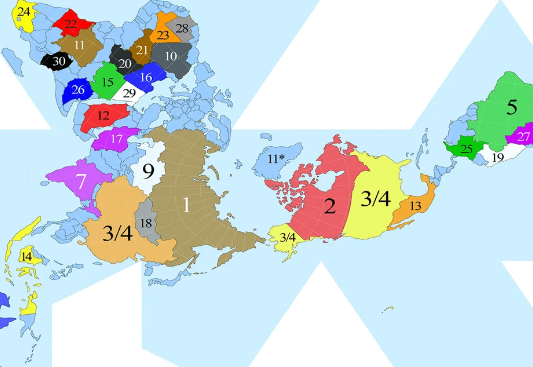
7 Country
The concept of ‘7 Country’ encapsulates a significant intersection of cultural heritage and artistic expression among seven nations, each contributing unique traditions and influences to a collective musical landscape. This collaboration not only fosters mutual respect but also highlights the complexities of identity within these diverse cultures. Understanding the nuances of this dynamic can reveal much about the evolution of music and its role in shaping societal narratives. As we explore the artists and styles that define ‘7 Country,’ we begin to uncover layers of meaning that resonate far beyond mere entertainment.
Overview of ‘7 Country’
The term ‘7 Country’ refers to a unique geopolitical concept that encompasses seven distinct nations, each contributing to a rich tapestry of cultural, economic, and political dynamics on the global stage.
These countries, while individually sovereign, share historical ties that shape their cultural roots and foster intricate relationships among them.
The diversity within the ‘7 Country’ framework is marked by regional variations that reflect unique traditions, languages, and social norms.
From the vibrant festivals that celebrate ancestral heritage to the culinary delights that narrate stories of migration and adaptation, each nation adds its unique flavor to the collective identity.
This concept also emphasizes the importance of collaboration and mutual respect among nations.
By recognizing their interconnectedness, the ‘7 Country’ framework encourages dialogue and cooperation, promoting shared goals such as sustainable development, cultural exchange, and economic prosperity.
As the world becomes increasingly interdependent, understanding the nuances of these seven nations is essential for fostering peace and freedom.
Thus, the ‘7 Country’ concept not only encapsulates geographical boundaries but also serves as a beacon of hope for unity amidst diversity.
See also: 7 Cir
Featured Artists
In the realm of ‘7 Country’, featured artists play a pivotal role in shaping its sound and cultural identity.
Their contributions not only highlight influential musical genres but also showcase iconic collaborations that have left a lasting impact on the genre.
Influential Musical Genres
Across diverse cultural landscapes, influential musical genres have shaped the careers of numerous artists, each contributing a unique sound and perspective that resonates with audiences worldwide.
Within this expansive realm, the evolution of country music stands out, reflecting its cultural significance as it intertwines with the lives of its listeners. Artists like Johnny Cash and Dolly Parton have not only honed the genre’s core elements—storytelling, heartfelt emotion, and instrumental richness—but have also pushed boundaries, incorporating influences from rock, blues, and folk.
The transformative power of country music is evident in contemporary artists such as Kacey Musgraves and Chris Stapleton, who blend traditional sounds with modern sensibilities, illustrating the genre’s adaptability. Their innovative approaches underscore the importance of authenticity and relatability, allowing them to connect deeply with fans across generations.
Moreover, the cross-pollination with genres like hip-hop and pop demonstrates country’s ability to evolve while maintaining its roots. This fluidity enhances its appeal, inviting a diverse audience into a shared space of freedom and expression.
Ultimately, the journey of country music reflects a dynamic cultural landscape, continually shaping and being shaped by the voices within it.
Iconic Artist Collaborations
Collaborations between iconic artists have played a pivotal role in redefining country music, showcasing the genre’s versatility and the rich tapestry of influences that emerge when creative talents unite. The collaboration dynamics between musicians such as Dolly Parton and Kenny Rogers, or more recently, Kacey Musgraves and Leon Bridges, illustrate how cross-genre partnerships enhance the storytelling and emotional depth inherent in country music.
These collaborations often lead to genre fusion, blending traditional country melodies with elements from pop, rock, and even hip-hop. For instance, Lil Nas X’s groundbreaking hit ‘Old Town Road’ not only topped charts but also opened doors for a new generation of artists, encouraging them to explore uncharted musical territories. This fusion invites diverse voices and perspectives, enriching the genre and appealing to a broader audience.
Moreover, collaborations can serve as a powerful platform for social commentary, as seen in the poignant works of artists like Chris Stapleton and Justin Timberlake. Their joint efforts emphasize the shared human experience, reinforcing the notion that music knows no boundaries.
In this evolving landscape, iconic artist collaborations continue to shape country music, marking a dynamic era of innovation and artistic expression.
Musical Styles and Influences
Influenced by a rich tapestry of cultural traditions and contemporary sounds, country music showcases a diverse array of musical styles that reflect the genre’s evolution over the decades. Rooted in American folk, blues, and gospel, country has absorbed various regional variations, each adding its unique flair. For instance, the twangy sounds of traditional bluegrass resonate in the Appalachian region, while the rhythmic influences of honky-tonk are prevalent in Texas.
Cultural influences play a pivotal role in shaping the genre. The infusion of rock and pop elements during the 1970s gave rise to the ‘Outlaw Country’ movement, characterized by artists like Willie Nelson and Waylon Jennings, who sought to break free from the commercial constraints of Nashville. Additionally, the incorporation of hip-hop and electronic music in recent years has further expanded the genre’s horizons, appealing to younger audiences and forging new creative pathways.
These dynamic interactions emphasize country music’s adaptability, allowing it to capture the essence of the American experience while resonating with broader global narratives. As a result, country continues to thrive, embracing both its roots and the ever-changing landscape of musical expression.
Notable Tracks to Listen
To fully appreciate the depth and diversity of country music, exploring a selection of notable tracks provides insight into the genre’s rich storytelling and emotional resonance.
Iconic songs such as Johnny Cash’s “Ring of Fire” illustrate the genre’s roots, blending folk influences with profound lyrical themes. Meanwhile, Dolly Parton’s “Jolene” showcases the power of vulnerability and heartache, a recurring theme that resonates deeply with listeners.
As modern trends evolve, artists like Kacey Musgraves and Chris Stapleton bring fresh perspectives to the genre, pushing boundaries while honoring traditional sounds. Musgraves’ “Follow Your Arrow” empowers listeners with a message of self-acceptance, reflecting contemporary values and the desire for freedom. Stapleton’s “Tennessee Whiskey” redefines classic country with its soulful delivery, merging blues elements that captivate both new and longtime fans.
Additionally, Maren Morris’s “The Bones” exemplifies resilience, highlighting the strength found in love. These tracks not only embody the essence of country music but also illustrate its adaptability in a changing musical landscape, inviting listeners to engage with the genre in meaningful ways.
Each song tells a story, inviting freedom of interpretation and connection.
Thematic Elements in Lyrics
What thematic elements resonate most deeply within country music lyrics often reflect the genre’s rich tapestry of human experience, delving into love, loss, heartache, and resilience. Central to this exploration is the art of lyrical storytelling, where each verse unfolds a narrative that captures life’s pivotal moments.
From tales of unrequited love to the bittersweet nostalgia of memories past, country lyrics embody authenticity, resonating with listeners on a profound emotional level. The heartache conveyed in songs often serves as a cathartic release, allowing audiences to confront their own struggles and joys.
Themes of resilience shine through, offering hope and encouragement in the face of adversity. This ability to weave personal experiences into relatable narratives fosters a deep connection between the artist and the listener.
Moreover, the imagery and symbolism present in country lyrics evoke vivid scenes, transporting audiences to familiar landscapes of rural life, vibrant relationships, and intimate gatherings.
Ultimately, the thematic elements encapsulated in country music lyrics not only celebrate the human spirit but also affirm the freedom to express one’s innermost feelings, making the genre a powerful voice in the tapestry of musical expression.
Impact on Country Music Scene
The impact of thematic elements in country music lyrics extends beyond mere entertainment, shaping the genre’s identity and resonating deeply with audiences across generations.
The cultural significance of country music is profound, as it often reflects the values, struggles, and joys of everyday life, connecting listeners to shared experiences. Themes of love, heartache, and perseverance encapsulate the American spirit, allowing fans to find solace and understanding in their own lives.
Moreover, the economic influence of country music is noteworthy, contributing significantly to the music industry and local economies. Concerts and festivals attract thousands, generating revenue for communities and providing a platform for emerging artists. The genre’s ability to cross over into mainstream music further amplifies its reach, inviting diverse audiences and fostering a sense of unity among listeners.
In this ever-evolving landscape, the impact of country music continues to thrive, as it adapts to contemporary issues while remaining rooted in tradition. The interplay between its cultural significance and economic influence ensures that country music not only entertains but also serves as a vital thread in the fabric of American culture, celebrating freedom and authenticity.
How to Experience ‘7 Country
Immersing oneself in the vibrant world of ‘7 Country’ offers a unique opportunity to explore the rich tapestry of narratives and sounds that define the genre, inviting listeners to connect with its heartfelt stories and cultural roots.
To truly experience ‘7 Country,’ one must engage with the regional variations that showcase its diversity. Each region contributes distinct influences, from the twang of traditional instruments in the Appalachian hills to the contemporary beats resonating in urban landscapes.
Attending cultural festivals is an essential way to dive deeper into this musical journey. These gatherings celebrate the essence of ‘7 Country,’ bringing together artists and fans to revel in the power of live performances. Festivals often feature local musicians, food vendors, and crafts, creating an immersive atmosphere where one can feel the rhythm of the community.
Additionally, exploring local music venues can provide insight into the genre’s evolving landscape. Listening to emerging artists and established acts allows for a genuine connection to ‘7 Country.’
Conclusion
In summation, ‘7 Country’ embodies a harmonious tapestry woven from the threads of diverse cultural narratives, echoing the shared histories and artistic expressions of its constituent nations.
The convergence of musical styles and lyrical themes creates a vibrant landscape where unity flourishes amidst diversity.
As this collaborative endeavor continues to evolve, it promises to illuminate the richness of heritage and foster deeper connections, ultimately enriching the global music scene with its distinctive and resonant voice.




